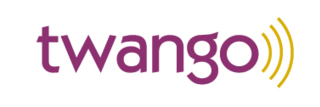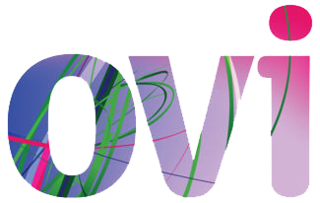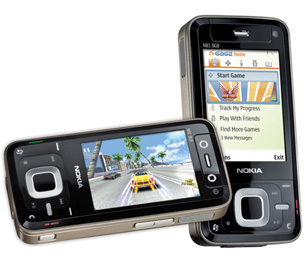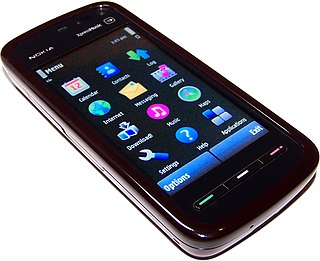
Nokia Corporation is a Finnish multinational telecommunications, information technology, and consumer electronics corporation, established in 1865. Nokia's main headquarters are in Espoo, Finland, in the greater Helsinki metropolitan area, but the company's actual roots are in the Tampere region of Pirkanmaa. In 2020, Nokia employed approximately 92,000 people across over 100 countries, did business in more than 130 countries, and reported annual revenues of around €23 billion. Nokia is a public limited company listed on the Helsinki Stock Exchange and New York Stock Exchange. It is the world's 415th-largest company measured by 2016 revenues according to the Fortune Global 500, having peaked at 85th place in 2009. It is a component of the Euro Stoxx 50 stock market index.
Mobile content is any type of web hypertext and information content and electronic media which is viewed or used on mobile phones, like text, sound, ringtones, graphics, flash, discount offers, mobile games, movies, and GPS navigation. As mobile phone use has grown since the mid-1990s, the usage and significance of the mobile devices in everyday technological life has grown accordingly. Owners of mobile phones can now use their devices to make photo snapshots for upload, twits, mobile calendar appointments, and mostly send and receive text messages, listen to music, watch videos, take mobile pictures and make videos, use websites to redeem coupons for purchases, view and edit office documents, get driving instructions on mobile maps and so on. The use of mobile content in various areas has grown accordingly.

BBC iPlayer is a video on demand service from the BBC. The service is available on a wide range of devices, including mobile phones and tablets, personal computers and smart televisions. iPlayer services delivered to UK-based viewers feature no commercial advertising. The terms BBC iPlayer, iPlayer, and BBC Media Player refer to various methods of viewing or listening to the same content. Viewing or recording live television broadcasts from any UK broadcaster or viewing BBC TV catch-up or BBC TV on-demand programmes in the UK without a TV licence is a criminal offence.

Microsoft Software Updater is a Windows and OS X based application launched in 2006, that enables customers to update and recover their mobile device firmware of a S40 or S60 or Lumia device from any Internet enabled access point. To avoid data loss users are prompted with on-screen advice on how to safely update their device.

Twango was an online media sharing site that supported multiple file types such as photos, video, audio, and documents. Founded in 2004 by Jim Laurel, Philip Carmichael, Randy Kerr, Serena Glover and Michael Laurel in Redmond, Washington, it provided users a means of repurposing their media, including sharing, editing, organizing and categorizing. In addition, Twango saved all the original media and its metadata. Non-members were free to browse the site, however only members could upload media to the site. Sign up for a basic account was free, and provided 250 megabytes of upload bandwidth a month.
Orb was a freeware streaming software that enabled users to remotely access all their personal digital media files including pictures, music, videos and television. It could be used from any Internet-enabled device, including laptops, pocket PC, smartphones, PS3, Xbox 360 and Wii video game consoles.

Ovi by Nokia was the brand for Nokia's Internet services. The Ovi services could be used from a mobile device, computer or via the web. Nokia focused on five key service areas: Games, Maps, Media, Messaging and Music. Nokia's aim with Ovi was to include third party developers, such as operators and third-party services like Yahoo's Flickr photo site. With the announcement of Ovi Maps Player API, Nokia started to evolve their services into a platform, enabling third parties to make use of Nokia's Ovi services.

The N-Gage service was a mobile gaming platform from Nokia that was available for several Nokia smartphones running on S60 (Symbian). N-Gage provided numerous games with 3D graphics into an application featuring online and social features. It takes its name from the original 2003 N-Gage gaming device, which it succeeded.

Nokia 5800 XpressMusic is a smartphone part of the XpressMusic line, announced by Nokia on 2 October 2008 in London and started shipping in November of that year. Code-named "Tube", it was the first touchscreen-equipped S60 device by Nokia – essentially it was the first device to run Symbian^1, also known as S60 5th Edition, the touch-specific S60-based platform created by the Symbian Foundation. The touchscreen features tactile feedback.
Novarra was a mobile internet software company founded in 2000 and based in Itasca, Illinois, USA. It created web-based services such as web internet access, portals, videos, widgets and advertising for mobile devices. Novarra provided access to the internet and other services through wireless handsets, PDAs and laptops and sold directly to operators, mobile handset manufacturers and internet brand companies. In 2010, Nokia acquired 100% of Novarra's shares.

MixRadio was an online music streaming service owned by Line Corporation. The service was first introduced by Nokia in 2011 as Nokia Music for Windows Phone, serving as a successor to Nokia's previous Nokia Music Store/Comes with Music/Ovi Music Store initiatives, which was based on the LoudEye/OD2 platform. After its acquisition of Nokia's mobile phone business, the service was briefly maintained by Microsoft Mobile Oy before it was sold to Japanese internet company Line Corporation in 2015. Following the acquisition, MixRadio expanded to Android and iOS in May 2015.

The Nokia X6 is a music-oriented capacitive touchscreen smartphone and portable entertainment device by Nokia. It was announced in early September 2009 during Nokia World 2009 in Germany.

The Nokia E6-00 is a smartphone running the Symbian^3 operating system. It supersedes the Nokia E72 as the new Symbian business mobility solution from Nokia following its announcement on 12 April 2011. It shipped with the new "Symbian Anna" version of Symbian^3, and originally retailed for 340 euros before taxes.
Nokia's strategic nomenclature can be traced back in 2005 when the Nseries line was launched, offering devices with flagship specifications and premium hardware at various price points. These devices were considered the "bread and butter" of the company and were often positioned to showcase their latest technologies. Thanks to the newfound consumer and enterprise interest in smartphones at the time, the company introduced four additional collections to diversify their product portfolio and meet demands in most market segments. These new phone series were named Eseries, targeting small business and enterprise customers; Xseries, providing consumer-grade multimedia-focused devices; Cseries, which Nokia used to target both the low-end and mid-range market segments; and Tseries, for devices exclusive to the Chinese market.
An App Store is a type of digital distribution platform for computer software called applications, often in a mobile context. Apps provide a specific set of functions which, by definition, do not include the running of the computer itself. Complex software designed for use on a personal computer, for example, may have a related app designed for use on a mobile device. Today apps are normally designed to run on a specific operating system—such as the contemporary iOS, macOS, Windows or Android—but in the past mobile carriers had their own portals for apps and related media content.
A mobile application or app is a computer program or software application designed to run on a mobile device such as a phone, tablet, or watch. Mobile applications often stand in contrast to desktop applications which are designed to run on desktop computers, and web applications which run in mobile web browsers rather than directly on the mobile device.
Microsoft mobile services are a set of proprietary mobile services created specifically for mobile devices, they are typically offered through mobile applications and mobile browser for Windows Phone, | platforms, BREW, and Java. Microsoft's mobile services are typically connected with a Microsoft account and often come preinstalled on Microsoft's own mobile operating systems while they are offered via various means for other platforms. Microsoft started to develop for mobile computing platforms with the launch of Windows CE in 1996 and later added Microsoft's Pocket Office suite to their Handheld PC line of PDAs in April 2000. From December 2014 to June 2015, Microsoft made a number of corporate acquisitions, buying several of the top applications listed in Google Play and the App Store including Acompli, Sunrise Calendar, Datazen, Wunderlist, Echo Notification Lockscreen, and MileIQ.
Nokia Mail and Nokia Chat were services developed by Microsoft Mobile and earlier by Nokia for its mobile phones. The service operated as a centralized, hosted service that acted as a proxy between the Messaging client and the user's e-mail server. The phone did not connect directly to the e-mail server, but instead sent e-mail credentials to Nokia's servers. On 13 August 2008 Nokia launched a beta release of "Nokia Email service", a push e-mail service, later incorporated into Nokia Messaging. The original version of Nokia Messaging was launched in 2008 with the Nokia N97 line of smartphones and was exclusive to Finland, the United Kingdom, the Netherlands, Germany, Spain, Singapore, Australia and Venezuela before being expanded to other countries and was exclusive to Symbian handsets, Series 40 support was announced for 2009. The first public version of Nokia Messaging supports Windows Live Hotmail accounts, Yahoo! accounts, and Google accounts and was available in 12 languages.

Club Nokia was a mobile internet digital distribution portal, similar to an App Store, operated by Nokia to provide special offers, paid-for ringtones, picture messages and game content directly to members. Following resistance from its mobile operator customers, Nokia partially closed the service and the brand became solely a consumer service and loyalty portal.

Nokia Download!, originally Nokia Catalogs, was a mobile application for Nokia devices that allowed access to digitally distributed media content. Catalogs/Download! came preloaded on most Symbian S60 smartphones from Nokia, as well as some later Series 40 feature phones. Most of the content was paid.












